Is Mazda "Skyactiv" a fraud?
#1
Instructor
Thread Starter
I'm a fan of Mazda and I like driving my daughter's Mazda6. But for years now, Mazda has been touting a "revolutionary" gasoline engine technology called "Skyactiv" that apparently combines the best of Otto, Atkinson, and Diesel-cycle philosophies. There have been lots of glossy articles written about how Skyactiv will be just wonderful. It might even slice bread and cut your cable bill!
But here's the rub: no one seems to be able to get their hands on an actual engine and drive it for a while to actually measure the fuel economy improvement. Some articles claim it will be in the range of 20-30%. Fine. Prove it.
So my question to you all is this: Are there any articles out there that authoritatively show actual fuel economy improvements? Or is Skyactiv just a showroom buzzword? So far Google is coming up empty for me. All I'm getting is the usual "in the final stages of fine-tuning." Sorry, doesn't do it for me.
EDIT: After posting, I noticed my title is incorrect. I think the technology is called "Skyactiv." Sorry.
But here's the rub: no one seems to be able to get their hands on an actual engine and drive it for a while to actually measure the fuel economy improvement. Some articles claim it will be in the range of 20-30%. Fine. Prove it.
So my question to you all is this: Are there any articles out there that authoritatively show actual fuel economy improvements? Or is Skyactiv just a showroom buzzword? So far Google is coming up empty for me. All I'm getting is the usual "in the final stages of fine-tuning." Sorry, doesn't do it for me.
EDIT: After posting, I noticed my title is incorrect. I think the technology is called "Skyactiv." Sorry.
#2
Lexus Fanatic
After posting, you can edit title-names yourself for a while (not sure exactly how long, as for me, it seems to vary). After that length of time has expired, a moderator will have to do it for you (you can PM one). Some moderators also simply edit titles on their own.
#3
Lexus Fanatic
so my question to you all is this: Are there any articles out there that authoritatively show actual fuel economy improvements? Or is Skyactiv just a showroom buzzword? So far Google is coming up empty for me. All I'm getting is the usual "in the final stages of fine-tuning." Sorry, doesn't do it for me.
Mazda's SkyActiv-X: diesel fuel economy from gasoline engine
John Voelcker292 CommentsSep 7, 2017Follow John2020 Mazda 3 prototypeMazda SkyActiv-X engine: increasing the air:fuel ratio to promote leaner burningMazda SkyActiv-X engine: improving the specific heat ratioMazda SkyActiv-X engine: why compression ignition mattersMazda SkyActiv-X engine: using the spark plug as a control factorMazda SkyActiv-X engine: additional compression from sparked fuel-air mixture ignites lean air-fuelMazda SkyActiv-X engine: controlling pre-ignitionMazda SkyActiv-X engine: spark-controlled compression ignition (SPCCI)Mazda SkyActiv-X engine: three changes to hardware and sensor ancillary equipment
More Galleries
Karma presents its electric-car vision to China and vies for partners
2020 Toyota Highlander Hybrid arrives, promises 34 mpg combined
2020 Aston Martin Rapide E: Track-ready electric car shown at Shanghai
2020 Kia Soul EV first drive review: 243 electric miles in the box
Ford Explorer Plug-In Hybrid released for Europe
2019 Audi e-tron EPA range revealed: Nothing to brag about, but aiming for the real world?
2020 Toyota Highlander Hybrid arrives, promises 34 mpg combined
2020 Aston Martin Rapide E: Track-ready electric car shown at Shanghai
2020 Kia Soul EV first drive review: 243 electric miles in the box
Ford Explorer Plug-In Hybrid released for Europe
2019 Audi e-tron EPA range revealed: Nothing to brag about, but aiming for the real world?









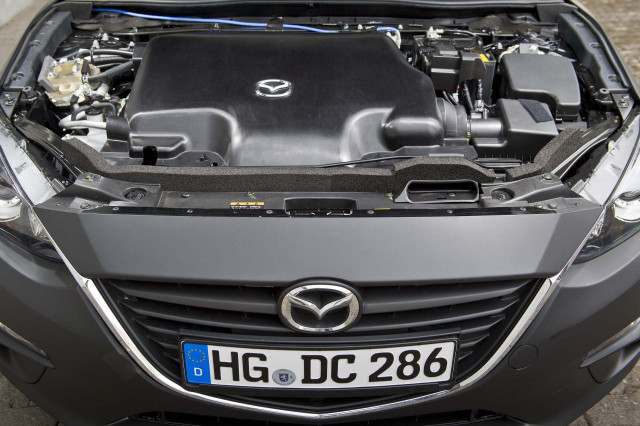
2020 Mazda 3 prototype
The internal combustion engine, now more than 200 years old, will be with us for a long time to come yet.
Powering more than 1 billion vehicles on the planet and almost 100 million new ones each year, it is the default way to move vehicles along the world's roads.
With its carbon emissions now conclusively implicated in climate change, electric cars may seem like a panacea—but they will take many decades to become even half of the planet's vehicle fleet.
DON'T MISS: How Mazda's SkyActiv-X engine, based on HCCI, actually works (video)
With that in mind, small Japanese carmaker Mazda has put a huge amount of research into improving the thermal efficiency of the standard combustion engine to lessen its ill effects on the environment.
The average gasoline engine wastes 70 to 75 percent of the fuel's energy content in heat and noise. Suppose that could be improved on, without expensive add-on ancillaries or hybrid systems with battery packs?
Two weeks ago, we drove running prototypes of the company's latest evolution of its SkyActiv engines, which will be the first mass-produced engines to operate on the principle of homogenous charge compression ignition, or HCCI.
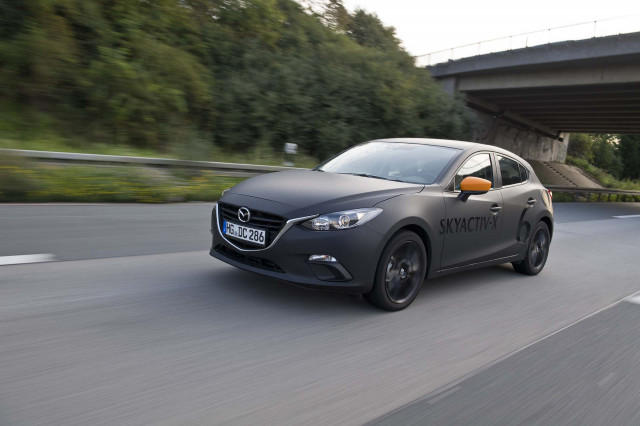

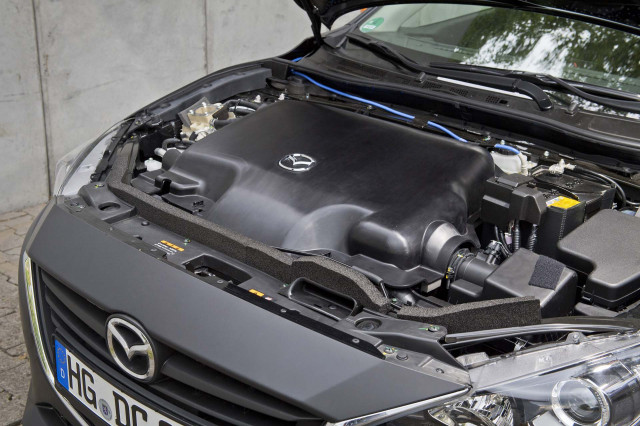
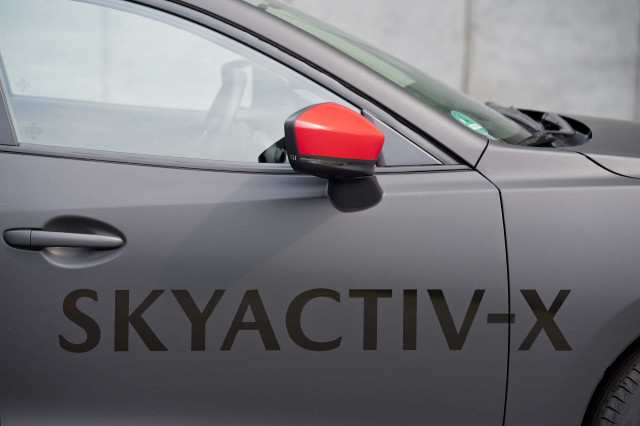 What Mazda calls its SkyActiv-X series represents the next evolution from the SkyActiv-G gasoline engines it launched in 2012.
What Mazda calls its SkyActiv-X series represents the next evolution from the SkyActiv-G gasoline engines it launched in 2012.With the highest compression ratio of any gasoline engine in production—14 to 1—those 2012 powerplants burned a leaner air-fuel mixture and consumed roughly 20 percent less fuel than engines of similar output from other makers.
Now, the 2.0-liter SkyActiv-X inline-4 offers another 20-percent improvement, meaning real-world gas mileage of almost 40 mpg in a prototype 2020 Mazda 3 compact hatchback during a mixed drive cycle that included some short 100-mph blasts on the German autobahn.
READ THIS: 2020 Mazda 3 prototype first drive: can spark-less engine ignite our passions?
That new engine will arrive for 2020, and it represents another leap in improvement. Mazda's achievement in putting an HCCI engine into production means it will have reached what engine designers for decades have considered a Holy Grail of efficiency.
The idea is to create an engine in which an exceptionally lean air-fuel mixture spontaneously combusts under compression alone. That’s how a diesel engine works, but the SkyActiv-X engine burns gasoline and its compression ratio of 15 or 16 to 1 is lower than that of many diesels.
While HCCI requires less fuel for the same specific output, any such engine must also be capable of operating with much richer air-fuel mixtures, ignited by a spark plug, to develop maximum power—which requires a lower compression ratio.
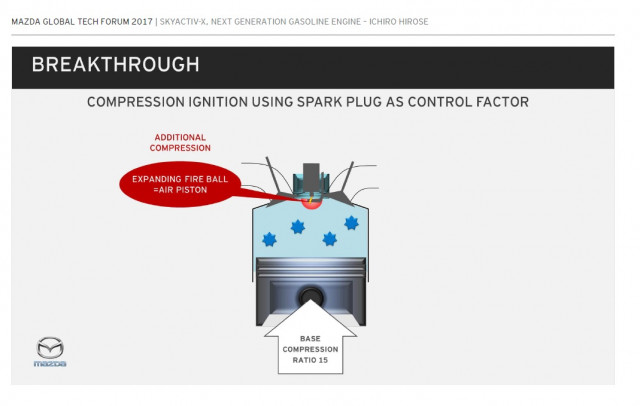
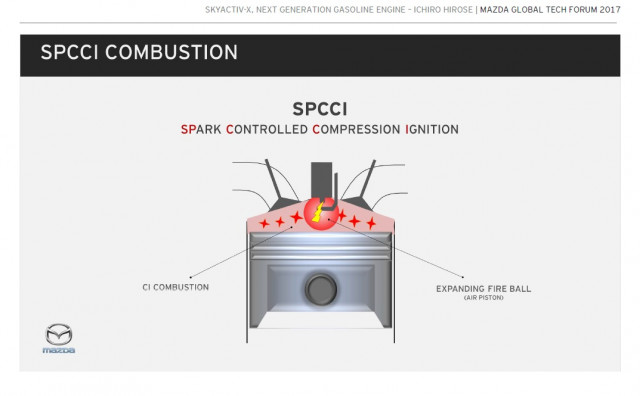
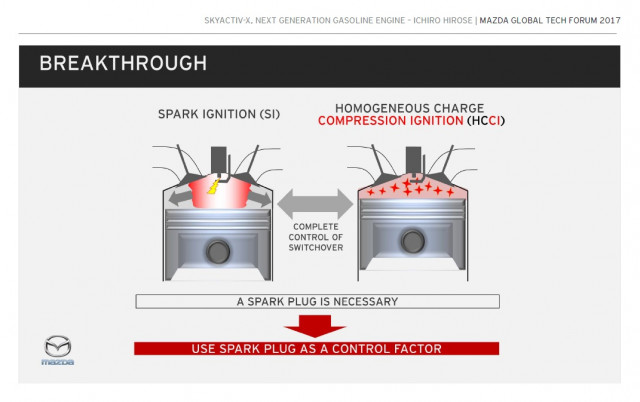
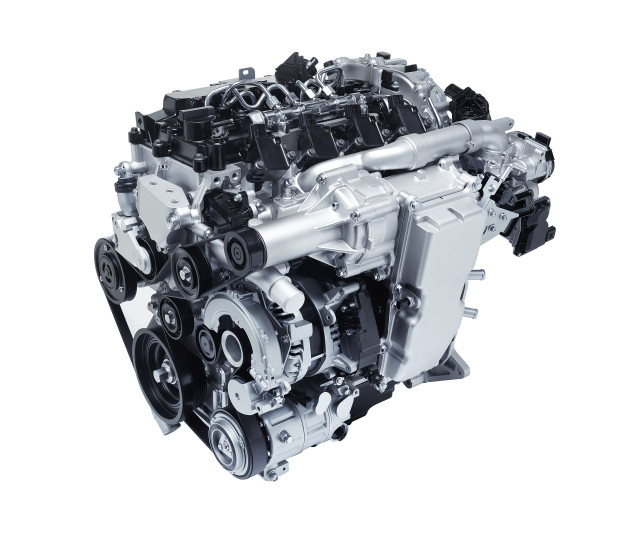 Previous attempts at HCCI engines from Daimler, General Motors, Nissan, and other makers varied the compression ratio within the combustion chamber mechanically.
Previous attempts at HCCI engines from Daimler, General Motors, Nissan, and other makers varied the compression ratio within the combustion chamber mechanically.From hinged connecting rods to crankshafts whose throws could be varied, rather like valve timing, they were fiendishly complex and added numerous additional parts within already complex internal combustion engines.
Mazda has taken a different path: the compression ratio applied to the lean air-fuel mixture is increased inside the combustion chamber by combusting a very small amount of rich air-fuel mixture close to the spark plug during the piston’s compression stroke.
CHECK OUT: 2019 Mazda 3 to feature world-first HCCI engine for efficiency: report
That spreads a pressure wave that further compresses the lean air-fuel mixture, which then ignites on its own, not as a result of being sparked.
Mazda has dubbed the technology Spark-Controlled Compression Ignition, abbreviated as SPCCI.
Its simplicity is indicated by the use of a slightly strengthened conventional SkyActiv-G block, with three alterations to ancillary components that make the lean combustion possible.
First, a very precise direct-injection system operates at much higher pressures than customary for a gasoline engine: 200 bar, or about 2,900 pounds per square inch.
This isn’t as high as the most recent diesel engines, at up to 2,200 bar or 32,000 psi, but it allows the fuel to be precisely injected into the right place below the spark plug despite the high compression ratio.
Second, an air compressor—Mazda goes to great lengths not to call it a supercharger—packs more air into the cylinder to keep the main air-fuel mixture sufficiently lean.
Finally, and most important, sensors in each cylinder and the most powerful engine-control processor Mazda has ever fitted allow real-time adjustment of the air-fuel mix and spark timing for each successive combustion event.
Previously, a 4-cylinder engine would be adjusted after all four cylinders had fired once. Now, the mix in each individual cylinder can be adjusted on the fly to ensure maximum efficiency depending on the operating demands.
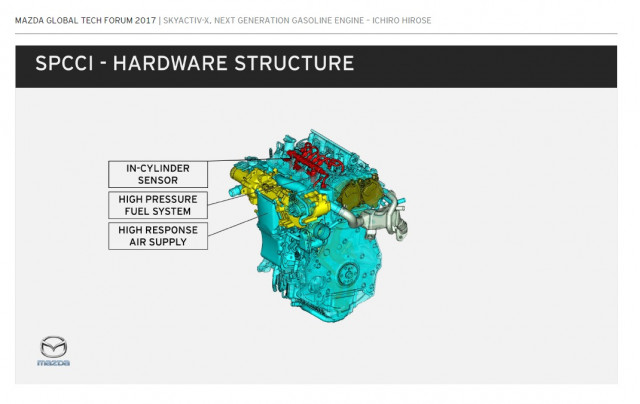
Mazda SkyActiv-X engine: three changes to hardware and sensor ancillary equipment
That’s something Mazda couldn’t have done until very recently: When the company’s development engineers had tried it with a 2012-vintage SkyActiv-G engine, the engine control unit simply froze under the computational load.
Powerful processors required
Only with half a decade’s advance in computing power could the necessary precision be achieved to adjust each combustion event in real time.
The engines we drove had a handful of rough spots in their software mapping, producing the occasional stumble or rough transition among engine speeds and gears.
But the results, taken directly from data loggers wired to the test cars' control systems, were impressive.
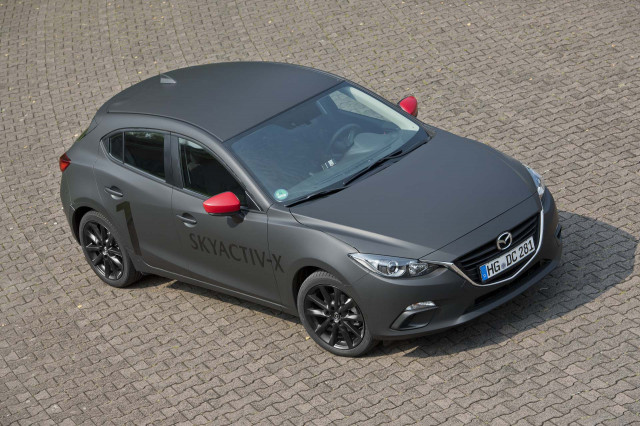
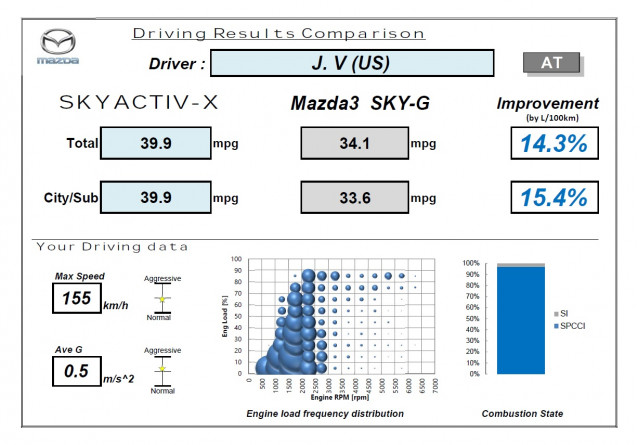
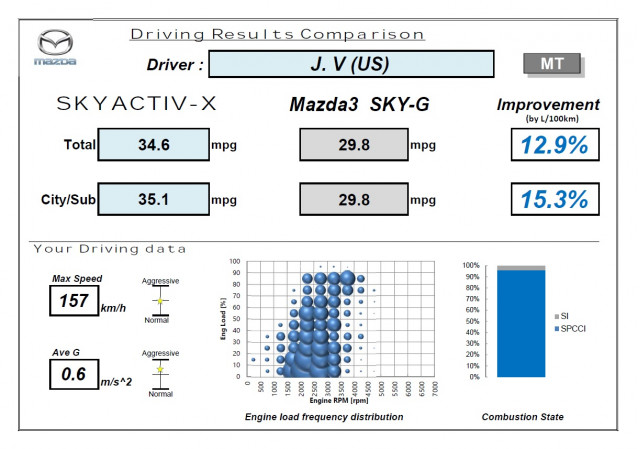 Of the two prototype 2020 Mazda 3 development cars we drove, the six-speed manual version delivered 34.6 mpg and the one with Mazda's six-speed automatic transmission returned 39.9 mpg.
Of the two prototype 2020 Mazda 3 development cars we drove, the six-speed manual version delivered 34.6 mpg and the one with Mazda's six-speed automatic transmission returned 39.9 mpg.Some of the drive cycle was standard traffic around suburban Frankfurt, including low-speed residential and town stop-and-go, but we also spent a few miles at up to 160 km/h (100 mph) during two short stints on the autobahn.
90-plus-percent HCCI
More interesting yet, the output from the data loggers showed that the engines in both cars spent more than 90 percent of their time in HCCI mode.
If these test results translate into production cars, Mazda will be able to offer a SkyActiv-X engine that's only somewhat more expensive than its current 2.0-liter model with far better fuel efficiency.
A reduction in carbon emissions and running costs of up to 20 percent is rarely found in new vehicles, much less with an engine that adds only an air pump, high-pressure fuel injectors, and in-cylinder sensors.
#4
Lexus Champion
Mazda claims they will reach 56% thermal efficiency an incredible increase over even a Toyota hybrid which I believe is about 40%.
I've yet to see any reviews and like you said a search turns up nothing.
So my question to you all is this: Are there any articles out there that authoritatively show actual fuel economy improvements? Or is Skyactiv just a showroom buzzword? So far Google is coming up empty for me. All I'm getting is the usual "in the final stages of fine-tuning." Sorry, doesn't do it for me.
#5
Lexus Fanatic
I'm a fan of Mazda and I like driving my daughter's Mazda6. But for years now, Mazda has been touting a "revolutionary" gasoline engine technology called "Skyactiv" that apparently combines the best of Otto, Atkinson, and Diesel-cycle philosophies. There have been lots of glossy articles written about how Skyactiv will be just wonderful. It might even slice bread and cut your cable bill!
But here's the rub: no one seems to be able to get their hands on an actual engine and drive it for a while to actually measure the fuel economy improvement. Some articles claim it will be in the range of 20-30%. Fine. Prove it.
So my question to you all is this: Are there any articles out there that authoritatively show actual fuel economy improvements? Or is Skyactiv just a showroom buzzword? So far Google is coming up empty for me. All I'm getting is the usual "in the final stages of fine-tuning." Sorry, doesn't do it for me.
EDIT: After posting, I noticed my title is incorrect. I think the technology is called "Skyactiv." Sorry.
But here's the rub: no one seems to be able to get their hands on an actual engine and drive it for a while to actually measure the fuel economy improvement. Some articles claim it will be in the range of 20-30%. Fine. Prove it.
So my question to you all is this: Are there any articles out there that authoritatively show actual fuel economy improvements? Or is Skyactiv just a showroom buzzword? So far Google is coming up empty for me. All I'm getting is the usual "in the final stages of fine-tuning." Sorry, doesn't do it for me.
EDIT: After posting, I noticed my title is incorrect. I think the technology is called "Skyactiv." Sorry.
#6
Super Moderator


#7
Lexus Champion
Why are you so insistent that there should be product reviews of a brand-new engine technology whose long-term strategic roadmap was unveiled in July 2018? Are you equally upset that we didn't have first drive reviews of the 2020 Supra four years ago? Or the mid-engined C7 corvette back in 1972? 

Trending Topics
#9
Instructor
Thread Starter
The link referenced below is of an article "How Skyactiv works" back in 2012, and the text indicates they'd been working on it for a decade prior.
So many years and yet still not quite ready. That's the reason for my suspicion there really isn't much there, there. Sort of like the Chrysler turbine car that was always ready "next year" for a decade. I think if an R&T road test showed a mere 5% increase in mileage, folks would wonder why not just make the car a hybrid, where 30% gains are common.
https://www.wardsauto.com/technology...chnology-works
So many years and yet still not quite ready. That's the reason for my suspicion there really isn't much there, there. Sort of like the Chrysler turbine car that was always ready "next year" for a decade. I think if an R&T road test showed a mere 5% increase in mileage, folks would wonder why not just make the car a hybrid, where 30% gains are common.
https://www.wardsauto.com/technology...chnology-works
#10
Lexus Test Driver
Yes. Thus far it is a scam and longterm tests and numbers prove it. Skyactiv has not produced anything out of the ordinary as far as mpg's. The exact same scam happened with Ford's Ecoboost, which is neither greener nor more powerful. These marketing dingers have gone on since the beginning of time and there are many other examples.
#11
Super Moderator

This was a different engine though, and was actually available for sale in 2012. My dad has one in his Mazda 3. Skyactiv is Mazda's umbrella for a family of engine technologies, much like Volkswagen has their TFSI engines, or Honda's now-abandoned "Earth Dreams" moniker. The 2.0L in his Mazda 3 is the Skyactiv-G, which was notable for having a rather high 13:1 or 14:1 compression ratio, plus direct injection. The "vaporware" engine that seems to be the topic of this thread is Skyactiv-X, which is a gasoline engine that uses compression ignition similar to a diesel. They first started talking publicly about that exactly 9 months ago.
#12
Lexus Fanatic
Why are you so insistent that there should be product reviews of a brand-new engine technology whose long-term strategic roadmap was unveiled in July 2018? Are you equally upset that we didn't have first drive reviews of the 2020 Supra four years ago? Or the mid-engined C7 corvette back in 1972? 

Point is everyone wants things instantly. If the internet went down, a lot of folks' IQ would drop 45 points...

#13
Lexus Fanatic
Yes. Thus far it is a scam and longterm tests and numbers prove it. Skyactiv has not produced anything out of the ordinary as far as mpg's. The exact same scam happened with Ford's Ecoboost, which is neither greener nor more powerful. These marketing dingers have gone on since the beginning of time and there are many other examples.
#14
Racer
iTrader: (5)
The link referenced below is of an article "How Skyactiv works" back in 2012, and the text indicates they'd been working on it for a decade prior.
So many years and yet still not quite ready. That's the reason for my suspicion there really isn't much there, there. Sort of like the Chrysler turbine car that was always ready "next year" for a decade. I think if an R&T road test showed a mere 5% increase in mileage, folks would wonder why not just make the car a hybrid, where 30% gains are common.
https://www.wardsauto.com/technology...chnology-works
So many years and yet still not quite ready. That's the reason for my suspicion there really isn't much there, there. Sort of like the Chrysler turbine car that was always ready "next year" for a decade. I think if an R&T road test showed a mere 5% increase in mileage, folks would wonder why not just make the car a hybrid, where 30% gains are common.
https://www.wardsauto.com/technology...chnology-works
"Mazda’s strategy, called "Skyactiv," is a comprehensive effort to substantially increase the efficiency of every element of every vehicle, beginning with engines and transmissions and continuing through bodies and chassis."
Early in that article it states that their end goal was to improve fuel economy globally by 30%. The article then goes on to explain how they're pursuing this goal, even mentioning that "engines, both gasoline and diesel, are made more efficient using a building-block process that progressively launches efficiency enhancements."
With that said, Mazda recently debuted their Skyactiv-D engine at the NYAS. I feel like that was a huge flop and a big step backwards because the fuel economy of the diesel is actually worse that the fuel economy of the -G 2.5T engine, with less hp and torque. I think it was stupid of Mazda to continue to develop it and then release it, but I suppose they want to recoup some of the R&D costs. The release of this engine actually seems to go against their goal, at least in NA where diesel isn't as popular as it used to be.
This was a different engine though, and was actually available for sale in 2012. My dad has one in his Mazda 3. Skyactiv is Mazda's umbrella for a family of engine technologies, much like Volkswagen has their TFSI engines, or Honda's now-abandoned "Earth Dreams" moniker. The 2.0L in his Mazda 3 is the Skyactiv-G, which was notable for having a rather high 13:1 or 14:1 compression ratio, plus direct injection. The "vaporware" engine that seems to be the topic of this thread is Skyactiv-X, which is a gasoline engine that uses compression ignition similar to a diesel. They first started talking publicly about that exactly 9 months ago.
#15
Lexus Fanatic
Join Date: May 2003
Location: Massachusetts
Posts: 7,864
Likes: 0
Received 0 Likes
on
0 Posts
I'm a fan of Mazda and I like driving my daughter's Mazda6. But for years now, Mazda has been touting a "revolutionary" gasoline engine technology called "Skyactiv" that apparently combines the best of Otto, Atkinson, and Diesel-cycle philosophies. There have been lots of glossy articles written about how Skyactiv will be just wonderful. It might even slice bread and cut your cable bill!
But here's the rub: no one seems to be able to get their hands on an actual engine and drive it for a while to actually measure the fuel economy improvement. Some articles claim it will be in the range of 20-30%. Fine. Prove it.
So my question to you all is this: Are there any articles out there that authoritatively show actual fuel economy improvements? Or is Skyactiv just a showroom buzzword? So far Google is coming up empty for me. All I'm getting is the usual "in the final stages of fine-tuning." Sorry, doesn't do it for me.
EDIT: After posting, I noticed my title is incorrect. I think the technology is called "Skyactiv." Sorry.
But here's the rub: no one seems to be able to get their hands on an actual engine and drive it for a while to actually measure the fuel economy improvement. Some articles claim it will be in the range of 20-30%. Fine. Prove it.
So my question to you all is this: Are there any articles out there that authoritatively show actual fuel economy improvements? Or is Skyactiv just a showroom buzzword? So far Google is coming up empty for me. All I'm getting is the usual "in the final stages of fine-tuning." Sorry, doesn't do it for me.
EDIT: After posting, I noticed my title is incorrect. I think the technology is called "Skyactiv." Sorry.
It's not just about the engine. It's about the whole body structure and transmission too.
It's not a "scam", just a branding of their technology that aims to make their vehicles more efficient while still being fun to drive
Ford's use of the term "Ecoboost" is just code for the models that are turbo. Whether it's more efficient or not isn't a scam but it aims to be in theory as long as you're not under boost all the time.
Automakers have been branding power trains forever. Not meant to scam people.


